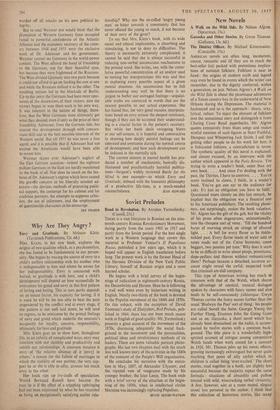Why Are They Angry ?
Envy and Gratitude. By Melanie Klein. (Tavistock Publications, 12s. 6d.)
MRS. KLEIN, in her new book, explores the origins of two qualities which, as a psychoanalyst, she has found to be fundamental to our person- ality. She begins by tracing the source of envy to a child's earliest relationship with his mother who is indispensable to him and whom he envies for her indispensability. Envy is connected with hatred, as gratitude is with love, and a child's development will depend on how successfully he overcomes his greed and envy in this first pattern of loving and hating. This in turn partly depends on an innate factor, his capacity for loving; if it is weak he will be the less able to bear the pain engendered by the conflict and at every stage, if the pattern is not well laid down, he will tend to regress, to be overcome by the primal feelings of envy and greed which underlie the neurotic's incapacity for loyalty, concern, responsibility, ultimately for love and gratitude.
Mrs. Klein goes on to show how, throughout life, in an infinity of complicated ways, envy may interfere with our stability and productivity and inhibit our relationships. A common instance is envy of 'the relative absence of it [envy] in others,' a reason for the failure of marriages in which the stability of one partner, the very sup- port he or she is able to offer, arouses too much envy in the other.
Her book rips up ivy-trails of speculation. Would Bertrand Russell have become the man he is if the effect of a crippling upbringing had not been minimised by what he has recorded as being an exceptionally satisfying earlier rela- tionship? Why are the so-called 'angry young men' so bitter towards a community that has never offered the young so much, if not because of their envy of the giver?
To say that Mrs. Klein's book, with its wide social and ethical implications, is absorbing and stimulating, is not to deny its difficulties. The theory is necessarily extremely complicated; it cannot be said that she is always successful in reducing non-verbal unconscious mechanisms to the printed word. She writes, too, with the cumu- lative powerful concentration of an analyst used to turning her interpretations this way and that in exploring every possible aspect of a given mental situation. An unconscious bar to full 'understanding may well be that there is no jargon to buffer our outraged feelings—unpalat- able truths are conveyed in words that are the nearest possible to our actual experience. She has found that, for very good reasons, interpreta- tions based on envy arouse the deepest resistance, though if they can be accepted their understand- ing is a crucial factor in the patient's recovery. But while her book deals swingeing blows at our self-esteem, it is hopeful and constructive in showing how deeply painful feelings can be tolerated and overcome during the normal course of development, and how such development can be induced in the mentally sick.
The current interest in mental health has pro- duced a number of mechanistic, basically dis- illusioned and psychiatrically harmful publica- tions—Sargant's widely reviewed Battle for the Mind is one example—to which Envy and Gratitude, imbued with the humanist philosophy of a productive life-time, is a much-needed






























 Previous page
Previous page